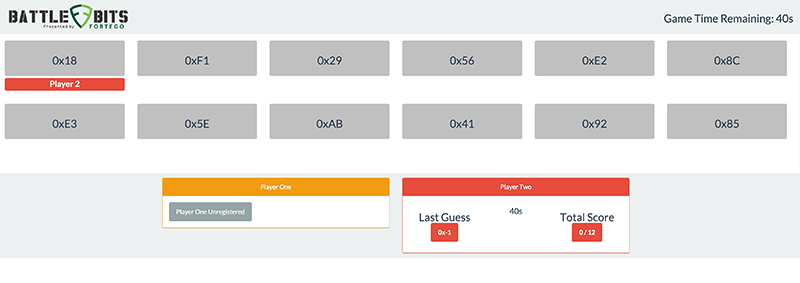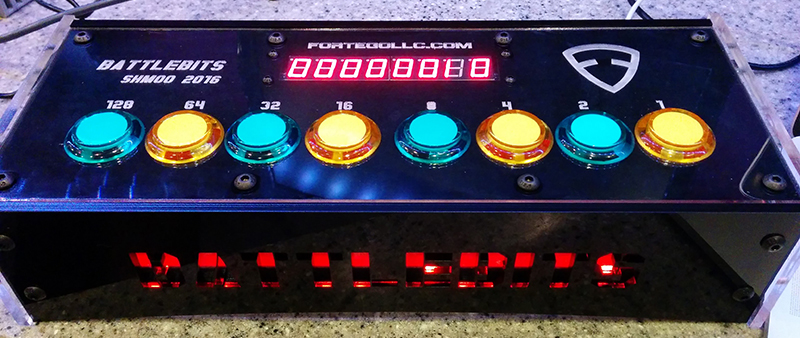Shmoocon is here, and that means a dozen or so security companies have bought a booth and are out to promote themselves. Some are giving out shot glasses. One is giving out quadcopters. It is exceedingly difficult to stand out in the crowd.
At least one company figured it out. They’ve built a game so perfect for the computer literate crowd, so novel, and so interesting it guarantees a line in front of their booth. Who are they? Fortego, but that’s not important right now. The game they’ve created, BattleBits, is the perfect conference booth.
The game play for BattleBits is as simple as counting to two. You’re presented with an eight-bit hexidecimal number, and the goal is to key them into a controller with eight buttons for 1, 2, 4, 8, 16, 32, 64, and 128. The answer for 0x56 is 01010110, and the answer for 0xFF is mashing all the buttons.

To anyone not familiar with hex, there’s actually a rather handy trick to the game: you only need to memorize 16 different numbers. Hexadecimal numbers are easily broken up into nibbles, or groups of four bits. All you need to do is solve one hexadecimal digit at a time.
The controllers, or ‘decks’ as they’re, are built around a BeagleBone and a custom cape running a mishmash of Javascript and Python. When the game starts the player or players are presented with random bytes in hexadecimal format. Input the right bits in the shortest amount of time and you’ll work your way up the leader board.
This is by far the best conference booth I’ve ever seen. The creator of the BattleBits hardware, [Riley Porter], says he’ll be releasing the design files and code for this game so anyone can make one, something we really look forward to.
[Riley] also got a video of someone entering nibbles super, super fast.
















There are 10 kinds of people in the world
Those who understand binary, and those who don’t
11 actually, those who wished they didn’t.
Knowing Hex and Octal can potentially make traveling on busses an issue.
Travelling on buses is all binary these days. ISA, VLB, PCI, PCIe, doesn’t matter.
technically these would still fall in the group of people who understand binary
…and those who thought this was a ternary joke
and those who know it’s an N-ary joke; and giggle at the binary, ternary, quaternary, quniary . . . decimal . . . duodecimal . . . sexagesimal and so on folks.
The real fun is figuring out what happens when N finally gets to ∞.
The best thing about a boolean is even if you are wrong, you are only off by a bit.
you mean you’re half wrong…
I wish no one ever repeat this joke
Ah, something with an advantage to old goats who don’t even have to think about it. The labels with powers of 2 for the binary digits are distracting. And one major objection! There is no 0x in a hex number. What is that C pre-processor stuff doing in there?
Do you have a better way of marking what numbering system is used?
20₁₆ instead of 0x20 or 20h or &h20. But as you can see, it’s a pain to type.
So you’re a mathematician rather than a programmer? Go make a LaTeX version XD
Yes. Write “Hex” above the display. Come on, you could have thought of that instead of prefixing every number with 0x. You didn’t even try!
Thanks @Brian for such a cool write up! We had a lot of fun making the game. @TheRegnirps you are 100% correct. We could tell low level c developers when they came up and just started tearing it up! The 0x really is a convention that we choose to pre-pend to the bytes :) As far as the con goes. We did not expect to see anyone beat our scores (thats why we made a separate database for us fortego guys) but OMG we got owned by a few awesome players. I think the record was around 29 seconds, which is just amazingly blindly fast.
https://goo.gl/photos/FG8J9Fc15nCUxvjGA
A video of one of the top 3 players in action. He later when on to hit around 29 seconds.
Thanks. Yes, I expected under 30 seconds but I can’t see how it moves on to the next number. I assumed you hit a “done” button. The sample screen has a quite a few that are only 1, 2, or 3 buttons to push and the fast patterns like 5 A and C. If it moves on automatically someone should be able to get under 25 seconds. Watching the player using it like a keyboard and comparing the time to 1 finger moving fro MSB to LSB withut hesitation, I believe they would be very close with a win for 1 finger. The example above has several that are 2 keys (18, 41) and about half the numbers would be really fast to punch in. I need the 0x removed for speed. My hex/binary comes from front panels, fusible link ROMs programmed with switches, and assembly and Forth (where you can change radix by typing “hex” or “decimal” in compiled code or the interpreter). Cool game. I’m temped to build one.
Those who are used to the Intel byteorder, will have a hard time playing this Game, I’ll guess.
Much easier using the Motorola byteorder.
Very basic browser-based implementation http://js.do/code/battlebits